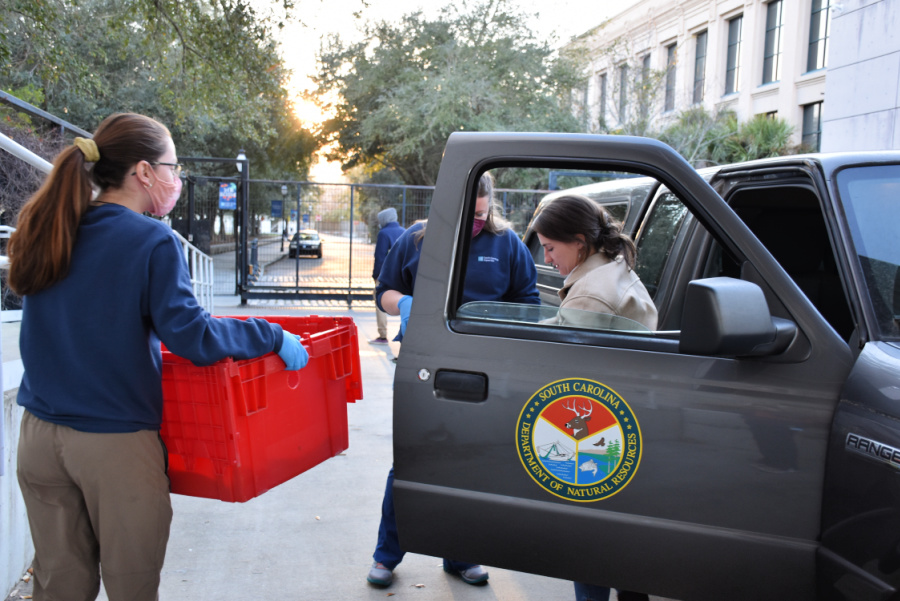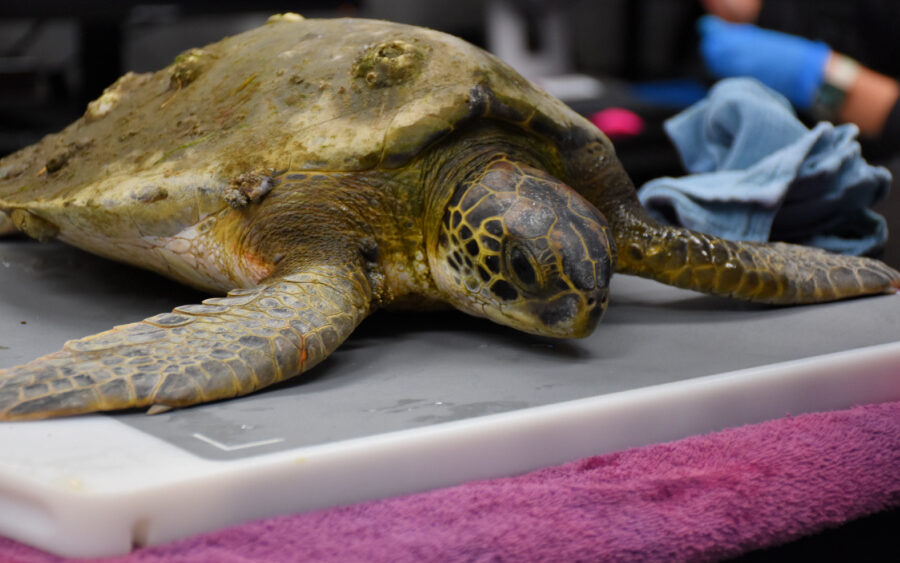Green (Chelonia mydas)
Stranding Location: Hilton Head Island, South Carolina
Arrival Date: 1/31/22
Age: Juvenile
Weight: 4.76 kg (10.5 lbs)
Case History
Mercury kicked off 2022 as our first patient of the year. Mercury was found lethargic and floating near a marina in Hilton Head Island. Hilton Head Island Turtle Patrol Team lead, Amber Kuehn (who is also a South Carolina Department of Natural Resources (SCDNR) permit holder) was called to respond to this lethargic turtle. Mercury’s body temperature was very low, indicating they were likely cold-stunned. Amber Kuehn contacted SCDNR and transported Mercury halfway to Charleston, meeting SCDNR technicians Meredith Bean and Cami Duquet who were able to bring Mercury the rest of the way to us for treatment. Shoutout to Amber, Cami and Meredith who had to endure a very chilly transport to Charleston to keep Mercury’s body temperature from rising too quickly. Cami and Meredith got a body temperature during the transport, so we were able to cool our medical lab down to match Mercury’s temperature at arrival.
Treatment
Upon arrival to the South Carolina Aquarium, Mercury received a cloacal body temperature, which is more accurate than a surface skin temperature. Mercury’s body temperature was about 53 degrees Fahrenheit, which is a low body temperature for a sea turtle. We also took a heart rate, drew blood and stained their eyes to check for any corneal abrasions. Mercury’s heart. rate was low. After vet staff reviewed the bloodwork results, they indicated that Mercury was very dehydrated. Vet staff decided to administer hetastarch, a fluid that helps pull in fluids into the vasculature space of the circulatory system to help the heart pump more efficiently. We took another heart rate after administering the hetastarch, and Mercury’s heart rate improved and started sounding stronger.
 Their blood results also indicated that they were in respiratory acidosis, which can occur when sea turtles hold their breath too long, causing a build up of carbon dioxide in their body which can lower the pH of their blood. When sea turtles breath hold, it is typically a stress response, so we monitor them closely and will correct it medically or by stimulating them to breath more often. Mercury also had a whistle when they took a breath, which is a sound we typically hear when a patient has pneumonia, a lung infection. We took several x-ray views so that vet staff could access their lungs. We a CT scan, but Mercury would not stay still long enough for us to successfully get one. X-rays showed that Mercury had a pretty bad case of pneumonia, so they were started on two different antibiotics to help combat the infection. We administered subcutaneous (under the skin) fluids with vitamins to help with rehydration and rechecked their bloodwork. Luckily, the respiratory acidosis appeared to be resolving! Dr. Lauren’s exam also found that they had a corneal abrasion on their right eye, which would need ophthalmic antibiotics to treat.
Their blood results also indicated that they were in respiratory acidosis, which can occur when sea turtles hold their breath too long, causing a build up of carbon dioxide in their body which can lower the pH of their blood. When sea turtles breath hold, it is typically a stress response, so we monitor them closely and will correct it medically or by stimulating them to breath more often. Mercury also had a whistle when they took a breath, which is a sound we typically hear when a patient has pneumonia, a lung infection. We took several x-ray views so that vet staff could access their lungs. We a CT scan, but Mercury would not stay still long enough for us to successfully get one. X-rays showed that Mercury had a pretty bad case of pneumonia, so they were started on two different antibiotics to help combat the infection. We administered subcutaneous (under the skin) fluids with vitamins to help with rehydration and rechecked their bloodwork. Luckily, the respiratory acidosis appeared to be resolving! Dr. Lauren’s exam also found that they had a corneal abrasion on their right eye, which would need ophthalmic antibiotics to treat.
Another important finding we saw on admit was that Mercury has a disease called fibropapillomatotis (FP), indicated by several FP tumors growing on the soft areas near their flippers. The FP tumors will have to be removed surgically, at a later date, when they are more stable. After the admit process was done, we raised the room temperature a few degrees so that Mercury’s body temp could rise slowly throughout the night. Mercury was then left to rest in a foam-padded bin overnight.
Update
February 1, 2022: The following morning, Mercury had another recheck on bloodwork, they received ophthalmic drops to their right eye and they were given more hetastarch and fluids. Mercury was still very quiet and lethargic, so we decided to let them rest in a shallow amount of water in the padded bin for the remainder of the day. The following day, we gave them another round of fluids, treated their eye and moved them into a shallow water tank. They started eating fish right away but are still unsure about lettuce. We will slowly increase their water level and diet as they get stronger. They will also receive a CT scan in the coming week to better evaluate their lungs and look for any internal FP tumors.
February 15, 2022: Mercury has been deemed well enough to get diet increases! They are eating all of their fish and veggies like a champ. They are still pretty slow moving but are doing well with small water level increases. It will still be a few weeks before they are in a full tank of water, but we are optimistic that they will handle it well. Mercury is still on antibiotics but will be finishing that up soon. They will be getting a CT scan this week.
March 15, 2022: Mercury has really improved since our last update! They are now eating all types of lettuces and veggies and are swimming around in a full tank now! They received their last antibiotic injection at the beginning of the month, so we are not pulling them as often. Later this week, we will do another weight check and set game plan for removing those tumors along with checking for any new tumor growths. Unfortunately, as Mercury continues to get healthier, so do their FP tumors. Mercury has been deemed stable enough to undergo a procedure later this month. We will begin the process of surgically removing the tumors as quickly as possible. Send Mercury all the good vibes!
April 15, 2022: Mercury has had quite the month since our last update! Mercury underwent FP removal surgery and was able to have all of their tumors removed in one procedure! Luckily for us (and Mercury), Dr. Terry Norton of the Georgia Sea Turtle Center drove up to help us out with this surgery. Using a CO2 laser, Dr. Norton and Dr. Lauren were able to remove all of the tumors. CO2 lasers are preferred for this type of surgery because they are able to burn away all of the diseased tissue with less blood loss. Mercury was kept on pain management drugs and put on a small course of antibiotics to prevent infection. Mercury’s FP removal sites are still on the mend, but are continuing to improve weekly. Way to go, Mercury!
May 15, 2022: Mercury has been healing well since their surgery. They have a good appetite and are defecating regularly! Mercury’s wounds are healed enough for them to safely receive soft seagrass enrichment. Mercury is getting sunned twice a week for UV and is getting weekly exams, so we can keep an eye out for potential FP regrowth. Wish Mercury luck as they continue to heal!
June 15, 2022: Mercury has been doing swimmingly since our last update! We have been pulling them twice weekly to give them UV therapy. So far, we have seen no new pap regrowth and their skin is continuing to heal up well from the FP removal surgery. Mercury is still not a fan of bell peppers, but they love their lettuce!
July 15, 2022: Mercury was pulled for bloodwork, a weight check and a physical exam. Everything looked great and we have not seen an FP regrowth. Once bloodwork results are in, we will be able to evaluate them for release in the near future, but no decision has been made yet. Mercury loves their backscratcher enrichment and is usually observed hanging out by it or actively scratching their shell on it.


